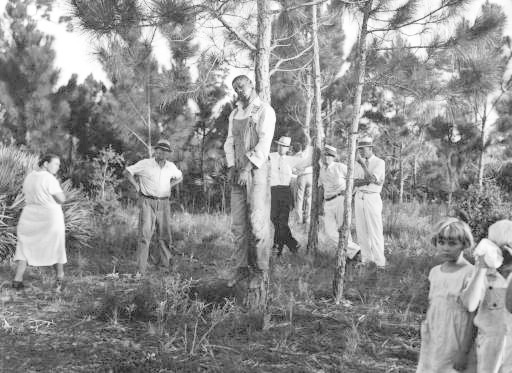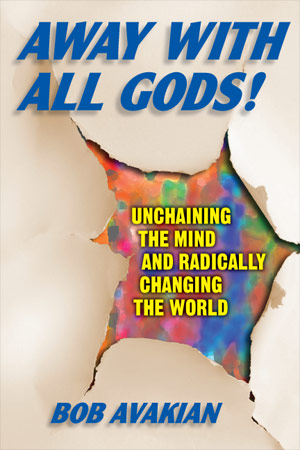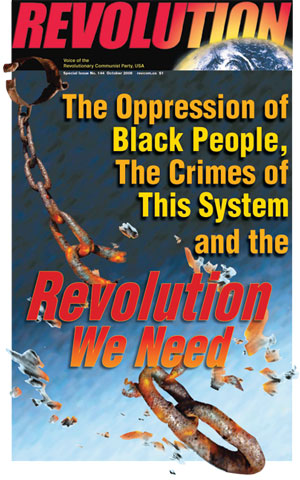Of Liberation and Love
Why Obama Embraced Forgiveness—and Why We Should NOT
by Lenny Wolff | July 8, 2015 | Revolution Newspaper | revcom.us
There’s a lot of confusion around and about these days about forgiveness, oppression, and how you preserve your humanity in the face of inhumanity—quite a bit of it spread by Obama and amplified in the media echo chamber. So let’s try to take this apart.
To get right to it: Should the oppressed be told to forgive their oppressors and the enforcers of their oppression?
No. First of all, the oppressed should be inspired and organized to fight against their oppression and led to overthrow their oppressors and root out the source of their oppression.
Let’s take an example that’s once again back in the news with the struggle to get rid of that white supremacist Confederate rag: slavery, the Civil War that was fought to end it, and its ongoing effect down to today.
Should enslaved people have been told—as they were by the spreaders of Christianity—to forgive their slave owners? Again, no. They should have organized to rebel against and try to overthrow slavery—as they tried in over 200 instances before the outbreak of the Civil War.
When the Civil War was at last fought and slavery finally WAS overthrown, what needed to happen next? First, you needed a state power that would have actually divided up the land that those former slaves had developed and worked for centuries and made sure that they had the means to farm that land. You needed a state power that would have ensured political rights, education, and other basic needs of those former slaves. And to do that, that new state power would have had to prevent those like the South's top General, Robert E. Lee, and the other leading monsters (and I don’t care how pious or genteel they thought they were, these people were monsters) from ever again raising their hands against the masses.
Remember, we’re talking about people who politically and militarily led a war to defend a whole system that had enslaved millions for generations and who killed hundreds of thousands in the process. They needed to be imprisoned for as long as just and necessary for their crimes and all of them should have been deprived of most political rights once freed—until the masses of former slaves and all other people desiring justice and freedom could be sure that these oppressors would not try to restore their “lost Paradise.”
But is this what happened? No, it is not. Very, very few of the leading criminals ever did a day of time in prison. After a relatively short period of time, the Union troops were first pulled back and then withdrawn, and the former slave owners were basically given a free hand to organize terror against the former slaves and others on the side of freedom. They took back from the former slaves what land had been freed, and they restored a form of feudal bondage very similar to slavery. They enforced this with the police and courts they once again controlled and the terror of the lynch mob—and they did so without a single ounce of the supposed mercy and forgiveness they so love to preach to the oppressed about. For over 150 years Black people paid very dearly in every dimension for this, and Black people are still paying dearly today.
And the idea of “forgiveness” played a big role in justifying and smoothing the way for this betrayal. Today we’re told that Obama’s eulogy in South Carolina was comparable to Lincoln’s second inaugural speech toward the end of the Civil War—as if that’s a good thing!* Lincoln is sanctified by today’s rulers for calling on the victorious North to proceed “with malice toward none and charity for all.” And Grant, the main Union general, is praised for allowing Lee, the commander of the slaveholder armies, to keep his sword.
No! Those were exactly the WRONG things to say. These words and gestures of forgiveness ideologically disarmed the former slaves and the other freedom fighters—to pave the way for and go along with the physical disarming of the slaves that occurred. And now, after that betrayal, we’ve had 150 years of white supremacy in other killing forms.
So forgiveness for oppressors and enforcers of oppression? No.
What about love? We should certainly love the masses. We should certainly love and cherish all those who give their lives to the cause of emancipation. And we should strive to approach every honest person with a generous spirit and open heart. The criticisms we make of people should be grounded in a belief in their capacity to transform their thinking and action.
But why in the world should we love the oppressors? Really—why? Yes, we should struggle with people who get caught up in movements that demonize and oppress people or who defend petty forms of privilege and carry out vicious acts against the people or other individuals. We should sharply get them to see how fucked-up what they’re doing is, and to fight with them to change. And yes, we should welcome it when such people break with the outlook of the oppressor and genuinely and truly transform and come over to the side of the people. But love them while they’re still carrying out their nasty shit? I don’t think so.
More to the point: if your love for the masses and emancipation is genuine, then you will fight like hell to make sure that the power for which those masses sacrifice will not be given back to the oppressors once achieved—even as you fight like hell to make sure that that power continues to serve the cause of emancipation.

After the Civil War, after only a few years, the Union troops were withdrawn from the South, and the former slave owners were basically given a free hand to organize terror against the former slaves and others on the side of freedom. They took back from the slaves what land had been freed, and they restored a form of feudal bondage very similar to slavery. They enforced this with the police and courts they once again controlled and the terror of the lynch mob—and they did so without a single ounce of the supposed mercy and forgiveness they so love to preach to the oppressed about. For over 150 years Black people paid very dearly in every dimension for this, and Black people are still paying dearly today. Here, a homeless tenant farmer, Rubin Stacy, was lynched in Florida, 1935.
These ideas—loving and forgiving your oppressor—are of course basic tenets of the Christian religion. And some people, it is true, draw inspiration from this religion to fight back against oppression, and we definitely unite with them in that fight. But ask yourself: WHY did the Roman emperor finally decide to make Christianity the official religion of the state? Why did the pillagers and enslavers of Europe bring the Christian Bible with them, along with the guns they used and the whiskey they peddled? Why does Obama—who is nothing but the instrument of a rotted-out system that kills thousands and grinds away billions day by day around the world—why does he “find his eloquence” when it comes time to preach the virtue of forgiveness to those whose oppression he presides over? This is a religion and a moral code that for centuries has been used by the powerful to enshrine submission and obedience to oppression and all forms of slavery as holy.
This leads to another point of morality. Some people say that fighting back—especially fighting back with force—robs you of your humanity. Bob Avakian (BA) speaks to this point in the “Revolution” talk in a very telling way: Does someone using force to prevent a rape somehow lose their humanity? Does someone using force to stop a lynching or a massacre lose their humanity?
Or take this example. Denmark Vesey actually organized the slave rebellion in Charleston which was betrayed and crushed in the early 1800s. (Obama obliquely refers to this as “working against slavery,” but seems to be unable to pronounce Vesey’s name or the word “rebellion.”) Did Denmark Vesey—who had already purchased his freedom and was no longer a slave—did he lose his humanity when he gave his life to organize a revolt against slavery? If he had had to kill those defending slavery in the course of doing this—as he knew he almost certainly would—would he have then lost his humanity? The question should answer itself.
And let’s turn the question around. What about those who witness a rape and do nothing, or just preach at the rapist? What happens to their humanity? What about all the white people who disapproved of the lynchings that followed the betrayal of Black people after the Civil War, but did nothing and even said nothing—what happened to their humanity? And what about those today who do nothing about the horrific mass incarceration and genocide—where is their humanity?
Does this mean that people should just go off, and engage in revenge? Absolutely not. Revenge lowers you to the level of the oppressor and robs you of your humanity. Any revolution that is truly about human emancipation should not be about revenge and in fact the leadership of the revolution will have to struggle against any tendencies in that direction. This is a critical point that has been emphasized by Bob Avakian.
In fact, the revolution we need today—the revolution which is possible today—goes far beyond what people conceived of as emancipation in the Civil War. The communist revolution aims at nothing less than the abolition of ALL forms of exploitation and oppression… all the class distinctions between people and the oppressive relations between people that flow out of and/or reinforce those… and all the modes of thinking that reflect and reinforce exploitation and oppression. This revolution has been defended and reconceived by Bob Avakian—and his body of work and method and approach, and the movement for revolution which he leads, grapples with the moral dimension on a much deeper level than has previously been the case. To get a sense of this, you can start with the fifth chapter of BAsics, which focuses on morality. And you can read the following, which closes the chapter and with which I’ll end this essay.
In the final analysis, as Engels once expressed it, the proletariat must win its emancipation on the battlefield. But there is not only the question of winning in this sense but of how we win in the largest sense. One of the significant if perhaps subtle and often little-noticed ways in which the enemy, even in defeat, seeks to exact revenge on the revolution and sow the seed of its future undoing is in what he would force the revolutionaries to become in order to defeat him. It will come to this: we will have to face him in the trenches and defeat him amidst terrible destruction but we must not in the process annihilate the fundamental difference between the enemy and ourselves. Here the example of Marx is illuminating: he repeatedly fought at close quarters with the ideologists and apologists of the bourgeoisie but he never fought them on their terms or with their outlook; with Marx his method is as exhilarating as his goal is inspiring. We must be able to maintain our firmness of principles but at the same time our flexibility, our materialism and our dialectics, our realism and our romanticism, our solemn sense of purpose and our sense of humor. (BAsics 5:24)
* By the way, let’s be clear on Lincoln. His aim in fighting the Civil War was not to end slavery but to “preserve the Union,” as he himself stated very clearly on more than one occasion. That is, he mainly fought the war to preserve the U.S. as a powerful capitalist nation. He only moved to end slavery when it became clear that he could not win the war without doing that. [back]
Volunteers Needed... for revcom.us and Revolution
If you like this article, subscribe, donate to and sustain Revolution newspaper.








